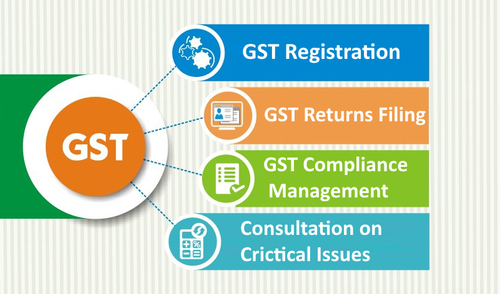GOODS AND SERVICE TAX
GST (Goods and services tax) is basically an Indirect tax which has been replaced by many Indirect taxes in India. It was actually passed in the Parliament on 29th March 2017 but the act came into effect on 1st July 2017 in India. GST is defined as the consumption tax where people who are engaged in the business whose annual turnover exceeds Rs. 40 lakhs is required to register as a normal taxable person. The regulations are applicable to everyone purchasing good and services at the same rate in India
GST REGISTRATION
What is the GST registration?
GST (Goods and services tax) is basically an Indirect tax which has been replaced by many Indirect taxes in India. It was actually passed in the Parliament on 29th March 2017 but the act came into effect on 1st July 2017 in India. GST is defined as the consumption tax where people who are engaged in the business whose annual turnover exceeds Rs. 40 lakhs is required to register as a normal taxable person. The regulations are applicable to everyone purchasing good and services at the same rate in India.
In addition to this, if the purchase was made by a business for sale to a customer, then the business can claim an input tax credit to set-off GST liability. Hence, the GST liability is pushed to the end-consumer through the use of the input tax credit mechanism. The procedure of GST Registration generally takes 2-6 working days to get done. All you need to file an application with the department and sign it with your digital signature.
Who should apply for GST registration?
· Those who are registered under the Pre-GST Law (i.e Excise, VAT, Service Tax etc.)
· Those businesses whose turnover is above the threshold limit of Rs. 40 lakhs (Rs. 20 lakhs for the North- Eastern States, J&K, Himachal Pradesh, and Uttarakhand)
· For the casual taxable person/ Non-resident taxable person.
· Those who are the agents of the supplier and Input service distributor.
· Individuals who are paying tax under the reverse charge mechanism.
· Those who supply via e-commerce aggregator.
· All E-commerce aggregator.
· Those who are supplying online information and database access or retrieval services from a place outside India to a person in India, other than a registered taxable person.

Documents
Documents Required for Goods & Service Tax
For Sole Proprietorship / Individual
Aadhaar card, PAN card, and a photograph of the sole proprietor
· Details of Bank account- Bank statement or a canceled cheque
· Office address proof:
o Own office –Copy of electricity bill/water bill/landline bill/ property tax receipt/a copy of municipal khata
o Rented office – Rent agreement and NOC (No objection certificate) from the owner
For Partnership deed/LLP Agreement
Aadhaar card, PAN card, Photograph of all partners.
· Details of Bank such as a copy of canceled cheque or bank statement
· Proof of address of Principal place of business and additional place of business :
o Own office –Copy of electricity bill/water bill/landline bill/ a copy of municipal Khata/property tax receipt
o Rented office – Rent agreement and NOC (No objection certificate) from the owner.
· In case of LLP- Registration Certificate of the LLP, Copy of board resolution Appointment Proof of authorized signatory- letter of authorization
For Private limited/Public limited/One person company
· Company’s PAN card
· Certificate of Registration
· MOA (Memorandum of Association) /AOA (Articles of Association)
· Aadhar card, PAN card, a photograph of all Directors
· Details of Bank- bank statement or a canceled cheque
· Proof of Address of Principal place of business and additional place of business:-
Own office – Copy of electricity bill/water bill/landline bill/ a copy of municipal khata/ property tax receipt
o Rented office – Rent agreement and NOC (No objection certificate) from the owner.
· Appointment Proof of authorized signatory- letter of authorization
GST
Types of GST in India
The Government of India classifies the Goods and Services Tax into four types – State goods and services tax, Central goods and Services tax, Integrated Goods and Service tax, Union territory goods, and services tax. The taxation rates for all four of them are different from each other.
Central Goods and Services Tax (CGST) is levied by the central government on the interstate supply of goods and services. The CGST is regulated and held by the central government.
State Goods and Services Tax is a tax levied on the supplies of goods and services but is applicable on the intrastate level. The SGST is collected and administered by the respective state government.
Integrated Goods and Services Tax is applicable on the goods and services that are supplied from one state to another. This tax is also applicable in the case of imports from India and export from India. The IGST tax is collected by the government of India.
Union Territory Goods and Services Tax is levied in the prominent union territories in India. UTGST is applicable in all union territories like Delhi, Chandigarh, Dadra, and Nagra Haveli, Andaman and Nicobar Islands, Daman and Diu, Lakshadweep, and Puducherry. The tax generated is collected by the government of the respective union territory. UTGST and CGST are levied together.
However, these taxes are applicable only after the businesses have registered themselves under the new GST regime.
Pricing
SAVE 60% COST..!!!
(Takes 2-3 days)
We're Here To Help!
Office
H.No 5-100, Shop No 2, Maheshwar Complex Kukatpally main road, Metro Piller NO.A-813, Kukatpally, Hyderabad, Telangana 500072
Hours
M-S: 8am – 8pm
Sunday: Closed
Call Us
(+91 – 9533300120)
